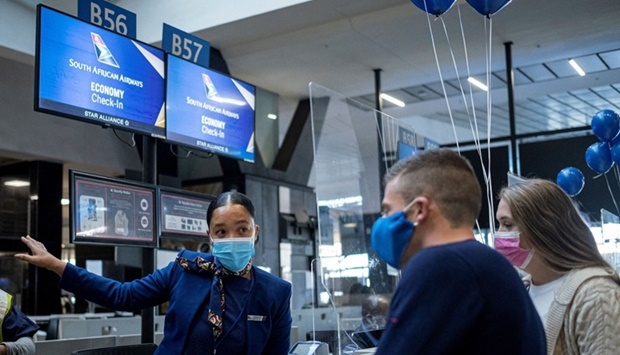| Beyond the Tarmac |
Amid concerns about new Omicron variant’s impact on the aviation industry, and a series of unilateral knee-jerk reactions from governments around the world, global airline capacity seems to remain stable.
According to the UK-based global travel data provider OAG, rates last week were steady at 78.3mn, even as the new coronavirus variant provokes hasty responses from several countries.
The discovery of the new variant in South Africa has panicked governments into once again restricting or entirely removing the freedom to travel.
Multiple countries have already imposed travel curbs in order to slow the spread of the new variant.
Analyst John Grant said, “Rates are steady at 78.3mn, half of one percentage point down and the whole airline industry continues to watch events very closely, marvelling at the next crazy restriction that encourages travellers to find cunning ways to avoid taking a test. So far, fingers crossed at least, the airlines have not panicked.”
The Omicron variant has sparked a global spree of travel bans and restrictions in recent days on international arrivals from several African countries.
Some countries have cancelled flights entirely from several southern Africa countries, while others imposed new quarantine restrictions on travellers arriving via certain destinations.
Southern Africa accounts for only a tiny portion of the world's international travel, but Reuters recently noted “sudden border restrictions and route suspensions have left some carriers with an uncertain future.”
Grant said there will inevitably be more restrictions on travel imposed in the next seven days, leading to people scrambling to get home earlier than anticipated, or sourcing lateral flow suppliers as part of their holidays. Such restrictions are at least now, intended to be short-term whilst authorities work out what is happening; what is happening is that the airline industry is being battered again but will survive.
Finishing the year at around three-quarters of pre-Covid levels will represent an improvement on the first half of 2021, and a steady level of shortfall has occurred over the last few months.
“Any hopes of kicking on in the second quarter of 2022 may now be at risk, but demand remains strong, at least based on the chaos of crowds I personally witnessed at one airport over the weekend,” Grant noted.
Undoubtedly, airlines are scrambling to limit the impact of the latest coronavirus variant on their networks, while delays or cancellations in bookings are threatening an already-fragile recovery for global tourism.
Although the World Health Organisation (WHO) has labelled Omicron a “variant of concern”, they were also quick to stress it was not one to panic about.
A pickup in long-haul traffic is seen critical for many cash strapped airlines, which have been left with severely strained balance sheets following the plunge in air travel last year.
Rising Covid-19 cases as well as the new border restrictions have prompted analysts to adjust their outlook for the industry. Analysts at HSBC, for example, expect the industry's recovery would be pushed back by a year.
IATA Director General Willie Walsh said, “After nearly two years of dealing with Covid-19, we should have progressed beyond these knee-jerk, unco-ordinated, Pavlovian-like responses, to recognise that the virus is well on its way to being endemic. Public health officials tell us that we should expect variants to emerge. And by the time they are detected, the reality is that they are probably already present around the globe.
“That is what is happening now. We are already finding Omicron in parts of the world far from South Africa, where it was first identified. Travel restrictions are not going to stop the spread. And they will do real harm to people and economies,” Walsh wrote in his blog.
With the Omicron variant now detected in several regions of the world, putting in place travel bans that target Africa, clearly tantamount to attacking global solidarity.
“Covid-19 constantly exploits our divisions. We will only get the better of the virus if we work together for solutions,” noted Dr Matshidiso Moeti, WHO Regional Director for Africa.
Renowned public health expert Amesh Adalja, who is a senior scholar at Johns Hopkins Center for Health and Security says, “Travel bans don't work. They end up stigmatising a country. So the countries that isolated this virus and reported it are now going to get penalised for being transparent.
“What is the implication there for future variants if people get punished this way with travel restrictions? And we have tests, we have tools. So, it's not as if we are helpless the way we were back in January of 2020. I don't think travel bans should be initiated or even be on the table,” Adalja asks.
"There is very little utility of these kinds of bans…Unfortunately, from what we know about the epidemiology of Sars-CoV-2 and the epidemiology of this variant, the horse has probably left the barn," said Saad Omer, director, Yale Institute of Global Health.
Clearly, travel restrictions have very little impact on virus spread. And these are attested by none other than some renowned global health experts who are either not sentimental about flying or have any vested interest in the airline industry.
And the last two years have demonstrated that they are correct!
According to the UK-based global travel data provider OAG, rates last week were steady at 78.3mn, even as the new coronavirus variant provokes hasty responses from several countries.
The discovery of the new variant in South Africa has panicked governments into once again restricting or entirely removing the freedom to travel.
Multiple countries have already imposed travel curbs in order to slow the spread of the new variant.
Analyst John Grant said, “Rates are steady at 78.3mn, half of one percentage point down and the whole airline industry continues to watch events very closely, marvelling at the next crazy restriction that encourages travellers to find cunning ways to avoid taking a test. So far, fingers crossed at least, the airlines have not panicked.”
The Omicron variant has sparked a global spree of travel bans and restrictions in recent days on international arrivals from several African countries.
Some countries have cancelled flights entirely from several southern Africa countries, while others imposed new quarantine restrictions on travellers arriving via certain destinations.
Southern Africa accounts for only a tiny portion of the world's international travel, but Reuters recently noted “sudden border restrictions and route suspensions have left some carriers with an uncertain future.”
Grant said there will inevitably be more restrictions on travel imposed in the next seven days, leading to people scrambling to get home earlier than anticipated, or sourcing lateral flow suppliers as part of their holidays. Such restrictions are at least now, intended to be short-term whilst authorities work out what is happening; what is happening is that the airline industry is being battered again but will survive.
Finishing the year at around three-quarters of pre-Covid levels will represent an improvement on the first half of 2021, and a steady level of shortfall has occurred over the last few months.
“Any hopes of kicking on in the second quarter of 2022 may now be at risk, but demand remains strong, at least based on the chaos of crowds I personally witnessed at one airport over the weekend,” Grant noted.
Undoubtedly, airlines are scrambling to limit the impact of the latest coronavirus variant on their networks, while delays or cancellations in bookings are threatening an already-fragile recovery for global tourism.
Although the World Health Organisation (WHO) has labelled Omicron a “variant of concern”, they were also quick to stress it was not one to panic about.
A pickup in long-haul traffic is seen critical for many cash strapped airlines, which have been left with severely strained balance sheets following the plunge in air travel last year.
Rising Covid-19 cases as well as the new border restrictions have prompted analysts to adjust their outlook for the industry. Analysts at HSBC, for example, expect the industry's recovery would be pushed back by a year.
IATA Director General Willie Walsh said, “After nearly two years of dealing with Covid-19, we should have progressed beyond these knee-jerk, unco-ordinated, Pavlovian-like responses, to recognise that the virus is well on its way to being endemic. Public health officials tell us that we should expect variants to emerge. And by the time they are detected, the reality is that they are probably already present around the globe.
“That is what is happening now. We are already finding Omicron in parts of the world far from South Africa, where it was first identified. Travel restrictions are not going to stop the spread. And they will do real harm to people and economies,” Walsh wrote in his blog.
With the Omicron variant now detected in several regions of the world, putting in place travel bans that target Africa, clearly tantamount to attacking global solidarity.
“Covid-19 constantly exploits our divisions. We will only get the better of the virus if we work together for solutions,” noted Dr Matshidiso Moeti, WHO Regional Director for Africa.
Renowned public health expert Amesh Adalja, who is a senior scholar at Johns Hopkins Center for Health and Security says, “Travel bans don't work. They end up stigmatising a country. So the countries that isolated this virus and reported it are now going to get penalised for being transparent.
“What is the implication there for future variants if people get punished this way with travel restrictions? And we have tests, we have tools. So, it's not as if we are helpless the way we were back in January of 2020. I don't think travel bans should be initiated or even be on the table,” Adalja asks.
"There is very little utility of these kinds of bans…Unfortunately, from what we know about the epidemiology of Sars-CoV-2 and the epidemiology of this variant, the horse has probably left the barn," said Saad Omer, director, Yale Institute of Global Health.
Clearly, travel restrictions have very little impact on virus spread. And these are attested by none other than some renowned global health experts who are either not sentimental about flying or have any vested interest in the airline industry.
And the last two years have demonstrated that they are correct!




